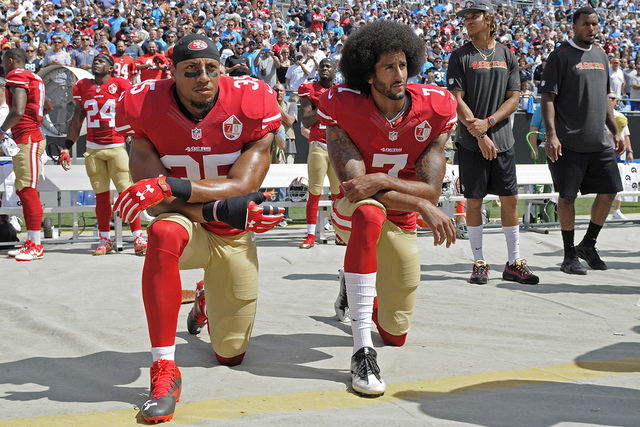By Martin Rogers
There are many reasons why boxing has all the ingredients to be smack in the middle of the current climate of social protest, otherwise known as the hottest talking point in American sports.
Just like the National Football League, the fight game has long been a magnet for young athletes from under-privileged and often minority backgrounds, the precise groups that continue to be strongest in publicizing their displeasure with modern societal imbalances.
Boxing’s greatest historical icon, Muhammad Ali, has protest as a cornerstone of his story, with his opposition to the Vietnam War and willingness to stick to his convictions as much part of his legacy as floating butterflies and rope-a-dope tactics.
Heck, boxing itself represents a struggle in search of a better life. Yet while athletes from the NFL and other team sports are at the forefront of the discussion and the primary target for President Donald Trump’s Twitter displeasure, boxing’s involvement has been more subtle so far.
“There are some reasons behind that,” Hall of Fame promoter Bob Arum said, in a telephone conversation with BoxingScene.com. “It is a different set of circumstances. But that doesn’t mean people care any less.”
Arum, who enjoyed a long promotional relationship with Ali, has a number of notable African-American and Hispanic fighters in his stable and admitted that he regularly discusses issues of inequality in America with them.

Leading lightweight contender Ray Beltran, who crossed illegally into the U.S. when he was a teenager, remains in a battle to earn a green card and has said that concerns over Trump’s policies have caused him to fear for his family’s future. World Boxing Organization featherweight champ Oscar Valdez has spoken out about the plight of his relatives, after an uncle was deported to Mexico and his grandfather narrowly avoided the same fate.
Arum hosted a “No Trump” undercard on a show headlined by Manny Pacquiao last November, and for Valdez’s victory over Genesis Servania last week donated 500 tickets to young Tucson, Ariz. immigrants who may be affected by Trump’s phase out of the Deferred Action for Childhood Arrivals (DACA) policy.
Terence Crawford, Arum’s best fighter, is African-American from a rough upbringing in Omaha, Neb., that included brushes with gang life. Crawford has the potential to be one of boxing’s figureheads if he allows his personality to shine through, being high on the pound-for-pound lists and with remarkable athletic gifts. Yet unlike so many minority NFL players Crawford made no protest when he knocked out Julius Indongo in August and it would be a surprise if he did so the next time he fights.
“It would be harder for a boxer to do something like that,” Arum said. “When the anthem is played at football everyone is there on the field, as a group. For boxing, it is played while the fighters are still in the locker room.”
It didn’t used to be such. Old fight footage regularly shows one or sometimes several anthems performed with the fighters already in the ring. Arum said it was scrapped when the athletes complained the time taken up by the songs caused them to cool down too quickly and affected their pre-fight preparation.
Also, a protest in boxing would require solo action. A football player can take a knee and, if his teammates are doing the same, will be just one of dozens of men making a unified statement, ahead of a game that will last three hours in a season spanning four months.
Boxing is far more individual, more immediate, making any possible distraction potentially disastrous in a sport where defeat is only ever a second’s mental lapse away. Lose a football game, and you get another shot at it next Sunday. Lose a fight, and your career, not to mention your health, is at stake.
Generally in sports, actions that involve making a political stand, like kneeling or standing with arms interlinked, are typically led or organized by senior veterans with a proven name.
Floyd Mayweather is the most famous fighter on the planet but there won’t be any anti-regime sentiment from the “Money” camp even if he does fight again, not with him being a personal friend of the president.
This article is a look at the topic and how it relates to boxing, and does not seek to lean to one side or the other. The only opinion ventured here is to suggest that whichever side you are on, the way modern sports and politics intersects is a fascinating issue of wide-ranging significance.
It is hard to argue with a person, or an athlete’s right to freedom of speech or expression, activities protectively enshrined in the constitution. Yet so too must validity be given to those whose beliefs in the importance and aura of the flag and anthem are genuinely held.
As for Arum, he doesn’t know exactly how all this plays out, whether this era goes down in history along with Ali’s time as a period of significant social change or whether the protests are a fleeting interlude. He is sure about one thing though, and that’s what he would do if one of his fighters decided to venture out early from the locker room in order to conduct a pre-bout protest during the anthem.
“I wouldn’t just support it,” Arum said. “I would join them.”

ADD COMMENT VIEW COMMENTS (337)